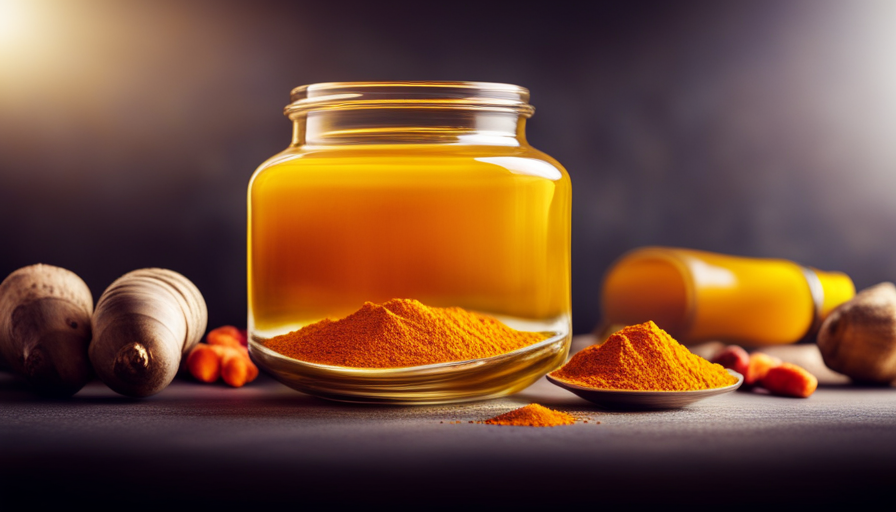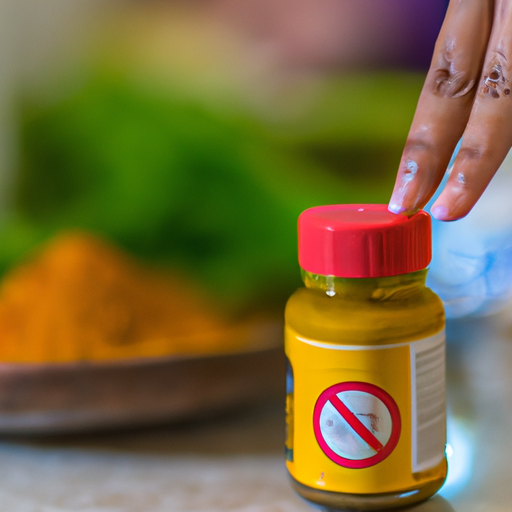Are you familiar with any natural remedies for eczema? Maybe you’ve been looking for ways to alleviate your eczema symptoms without depending on medication.
One theory that has gained popularity in recent years is that turmeric tea can help alleviate eczema symptoms. But is there any truth to this theory?
Eczema is a chronic skin condition that affects millions of people worldwide. It is characterized by dry, itchy, and inflamed skin that can be very uncomfortable and even painful. While there is no known cure for eczema, there are various treatment options available to manage symptoms.
However, many people are turning to natural remedies as a way to avoid the potential side effects of medication. Turmeric, a spice commonly used in Indian cuisine, has been suggested as a natural remedy for eczema.
But before you start brewing a pot of turmeric tea, let’s take a closer look at the science behind this theory.
Key Takeaways
- Turmeric tea contains curcumin, which has anti-inflammatory properties and may improve skin health and reduce severity of eczema flare-ups.
- Studies on the effectiveness of turmeric tea as a natural remedy for eczema have varying results and are limited in sample size and duration.
- Concentration of curcumin in turmeric tea may vary depending on preparation method and quality, and large amounts may have adverse effects and interact with certain medications.
- Turmeric tea should not replace medical advice and management of eczema symptoms should also include avoidance of triggers, good skin hygiene, and other natural remedies such as coconut oil, colloidal oatmeal, apple cider vinegar, dietary changes, and holistic approaches.
Understanding Eczema
Eczema can’t be cured, but it can be managed with proper care and treatment. Understanding the symptoms and triggers of eczema is essential in managing the condition.
Symptoms of eczema include red, itchy, and dry skin, which can often be accompanied by swelling, blisters, and scaly patches. Eczema can appear anywhere on the body, but it’s most commonly found on the face, neck, hands, and feet.
Triggers of eczema can vary from person to person, but common triggers include stress, irritants, allergens, and climate changes. Identifying and avoiding triggers can help prevent eczema flare-ups.
Additionally, maintaining good skin hygiene, using gentle skincare products, and keeping the skin moisturized can also help manage eczema symptoms.
Now, let’s dive into the science behind turmeric and its potential benefits for eczema.
The Science Behind Turmeric
If you’re interested in understanding the science behind turmeric, you’ll find that it has a rich history of traditional uses.
For centuries, it’s been used in Ayurvedic medicine to treat a variety of ailments.
Turmeric’s active ingredient, curcumin, is what gives it its powerful anti-inflammatory properties, making it a popular natural remedy for a range of conditions.
By exploring the history of turmeric’s traditional uses and understanding its active ingredients, you can better appreciate its potential health benefits.
History and Traditional Uses
You may be surprised to learn that turmeric tea has been used for centuries in traditional medicine for a variety of ailments, like a golden key unlocking a treasure trove of health benefits.
Traditional practices and cultural significance have made turmeric an important part of Ayurvedic medicine, where it is used to treat skin conditions, digestive issues, and even depression.
In Chinese medicine, it’s believed to promote circulation and reduce inflammation.
Turmeric’s use in traditional medicine is not limited to Asia. In parts of Africa and the Caribbean, it has been used to soothe stomach pain, reduce fever, and treat infections.
Its bright yellow color also made it a popular natural dye for textiles.
These historical uses of turmeric demonstrate its versatility and importance in various cultures around the world.
As we explore further, we’ll delve into the active ingredients and anti-inflammatory properties of turmeric that make it a potential remedy for eczema.
Active Ingredients and Anti-Inflammatory Properties
By understanding the active ingredients and anti-inflammatory properties of turmeric, we can better appreciate its potential health benefits beyond just treating eczema. Curcumin, the active ingredient in turmeric, has been shown to have powerful antioxidant and anti-inflammatory properties.
Inflammation is a key factor in many chronic diseases, including eczema, and curcumin has been shown to inhibit inflammatory pathways in the body. In addition to its anti-inflammatory properties, turmeric has also been studied for its potential benefits in reducing the risk of chronic diseases such as cancer, Alzheimer’s disease, and heart disease.
While more research is needed to fully understand the health benefits of turmeric, incorporating it into your diet through turmeric tea or other recipes may be a simple and effective way to promote overall health and well-being.
Turmeric Tea as a Natural Remedy
If you’re looking for a natural way to potentially improve your eczema symptoms, turmeric tea may be worth considering. Making turmeric tea is easy and can be done in just a few steps.
Some studies have suggested that turmeric may have anti-inflammatory properties, which could help with eczema-related inflammation and itching.
How to Make Turmeric Tea
Nailing the perfect recipe for turmeric tea is as easy as pie, and it’s the perfect way to soothe your eczema-prone skin. Here’s how to make it:
-
Boil 2 cups of water in a pot.
-
Add 1-2 teaspoons of turmeric powder and 1 teaspoon of honey to the water.
-
Let the mixture simmer for 5-10 minutes.
-
Strain the tea and pour into a cup.
Turmeric tea can be made with various ingredients, such as ginger, lemon, cinnamon, and black pepper. These variations not only add flavor to the tea but also enhance its health benefits.
Now that you know how to make turmeric tea, let’s explore its potential benefits for eczema.
Potential Benefits for Eczema
One big perk of incorporating turmeric into your diet is its potential benefits for soothing irritated skin, like eczema. Turmeric is known for its nutritional benefits, containing anti-inflammatory and antioxidant properties. These properties can help reduce inflammation, redness, and itchiness associated with eczema.
Moreover, turmeric tea is one of the alternative remedies that people with eczema can try to alleviate their symptoms. Drinking turmeric tea regularly may help improve skin health and reduce the severity of eczema flare-ups. While more research is needed to fully understand the effects of turmeric tea on eczema, many people have reported positive results from incorporating this tea into their diet.
In the next section, we’ll explore the research on turmeric tea and eczema in more detail.
Research on Turmeric Tea and Eczema
If you’re interested in learning about the research on turmeric tea and its potential effects on eczema, here’s what you need to know.
Several studies have investigated the use of turmeric tea as a natural remedy for eczema, with varying results.
While some studies have shown promising effects, there are also limitations to consider, such as small sample sizes and lack of long-term data.
Overview of Studies
You’re seriously asking if there’s any solid proof that turmeric tea can actually help soothe your eczema? Well, let’s take a look at the research – or lack thereof.
There are research gaps when it comes to studying the effects of turmeric tea on eczema. Most studies on turmeric have focused on the active component curcumin, which has been shown to have anti-inflammatory effects. However, there are limited studies that have investigated the potential benefits of consuming turmeric tea specifically for eczema.
Practical considerations also need to be taken into account. For example, the concentration of curcumin in turmeric tea may vary depending on the preparation method and quality of the turmeric used. Additionally, consuming large amounts of turmeric tea may have adverse effects on the body, such as gastrointestinal issues or interactions with certain medications. Therefore, it’s important to consult with a healthcare professional before incorporating turmeric tea into your eczema treatment plan.
With that said, let’s explore the results and limitations of the existing studies on turmeric tea and eczema.
Results and Limitations
Now let’s delve into what the studies have found and the potential shortcomings of their findings. While some studies have shown that turmeric tea can be effective in reducing eczema symptoms, others have found no significant difference compared to a placebo. Additionally, the studies have been limited in sample size and duration, making it difficult to draw definitive conclusions about the effectiveness of turmeric tea for eczema.
Furthermore, the effectiveness evaluation of turmeric tea for eczema has been hindered by the lack of standardization in terms of dosing and preparation methods. Different studies have used varying concentrations of turmeric and different forms of the herb, such as powdered or fresh turmeric, which can affect the bioavailability of its active components. Therefore, more rigorous and standardized studies are needed to fully evaluate the potential benefits of turmeric tea for eczema.
Moving on to the subsequent section about using turmeric tea for eczema, it is important to consider these limitations and the need for further research before incorporating turmeric tea into your eczema treatment plan.
Using Turmeric Tea for Eczema
Adding turmeric to your tea may provide relief for eczema symptoms, as it contains anti-inflammatory properties that can soothe irritated skin. Turmeric tea benefits are many, and it is considered to be one of the most effective natural remedies for eczema. Not only does it possess anti-inflammatory properties, but it is also rich in antioxidants that can protect your skin from environmental damage.
To make turmeric tea, you’ll need some ground turmeric, water, and a sweetener of your choice. You can also add other ingredients like ginger, lemon, or honey for added flavor. Here is a table that shows some popular brewing techniques for making turmeric tea:
| Brewing Technique | Ingredients | Directions |
|---|---|---|
| Traditional | Ground turmeric, water, black pepper | Boil water, add turmeric and black pepper, simmer for 10 minutes, strain and add sweetener |
| Golden Milk | Ground turmeric, almond milk, black pepper, honey | Heat almond milk, add turmeric and black pepper, simmer for 10 minutes, strain and add honey |
| Iced | Turmeric tea, lemon, honey, ice | Brew turmeric tea, add lemon and honey, pour over ice |
| Ginger Turmeric | Ground turmeric, ginger, water, honey | Boil water and ginger, add turmeric, simmer for 10 minutes, strain and add honey |
| Turmeric Chai | Ground turmeric, black tea, cinnamon, cloves, cardamom, milk, honey | Brew black tea with spices, add turmeric, milk, and honey |
While turmeric tea can be a helpful natural remedy for eczema, there are other options that you can explore as well. Let’s take a look at some other natural remedies for eczema and how they can be used to manage symptoms.
Other Natural Remedies for Eczema
Natural remedies are a popular choice for managing eczema symptoms, with many people finding relief from using products like coconut oil, colloidal oatmeal, and apple cider vinegar. Coconut oil has anti-inflammatory and moisturizing properties, which can help soothe dry and itchy skin.
Colloidal oatmeal has been shown to reduce inflammation and itching, while apple cider vinegar can help restore the skin’s natural pH balance. Dietary changes can also have a positive impact on eczema symptoms. Foods high in omega-3 fatty acids, such as salmon and flaxseed, have anti-inflammatory properties that can help reduce the severity of eczema flare-ups.
Probiotics, found in yogurt and fermented foods, can also improve gut health and reduce inflammation in the body. By incorporating natural remedies and dietary changes into your eczema management routine, you may find relief from uncomfortable symptoms.
Next, let’s explore some lifestyle changes that can also help manage eczema.
Lifestyle Changes to Manage Eczema
To better manage your eczema, you should focus on making lifestyle changes that can bring relief to your skin and improve your overall quality of life. Dietary changes can play a significant role in managing eczema symptoms. It is important to avoid foods that trigger eczema flare-ups, such as dairy, gluten, and processed foods. Instead, opt for anti-inflammatory foods such as fruits, vegetables, whole grains, and lean proteins. Incorporating foods that are high in omega-3 fatty acids, such as salmon, flaxseed, and chia seeds, can also help reduce inflammation in the body.
Managing stress is also crucial in managing eczema symptoms. Stress can trigger eczema flare-ups and make symptoms worse. Engaging in relaxation techniques such as meditation, yoga, or deep breathing can help reduce stress levels. It is also important to prioritize sleep and engage in regular exercise to improve overall physical and mental health. By focusing on these lifestyle changes, you can better manage your eczema symptoms and improve your quality of life. Seeking professional help may also be necessary for more severe cases.
| Dietary Changes | Stress Management |
|---|---|
| Avoid foods that trigger eczema flare-ups | Engage in relaxation techniques such as meditation, yoga, or deep breathing |
| Opt for anti-inflammatory foods such as fruits, vegetables, whole grains, and lean proteins | Prioritize sleep and engage in regular exercise |
| Incorporate foods that are high in omega-3 fatty acids |
To continue managing your eczema, it may be necessary to seek professional help. This may include consulting with a dermatologist or allergist to determine triggers and develop a treatment plan. By taking these steps, you can better manage your eczema symptoms and improve your overall quality of life.
Seeking Professional Help
If you’re struggling with eczema, seeking professional help can be crucial to managing your symptoms.
It’s important to know when to see a doctor, as they can help diagnose and treat your condition.
Your doctor may recommend potential medical treatments, such as prescription creams or oral medications, to help alleviate your symptoms.
When to See a Doctor
Visiting a doctor is crucial if eczema symptoms persist despite turmeric tea and other home remedies. While natural remedies and self-management strategies may be effective for some, severe symptoms may require medical intervention. It is important to seek professional help if the following symptoms persist:
| Symptoms | Indicators |
|---|---|
| Itching and dryness | Skin appears rough, scaly, and thickened. |
| Redness and inflammation | Skin is swollen, painful, and warm to the touch. |
| Oozing and crusting | Skin has blisters that may leak fluid and form crusts. |
When experiencing any of these symptoms, it is best to consult a healthcare professional who can provide alternative treatments or lifestyle changes to manage eczema in the long term. Holistic approaches, such as acupuncture and relaxation techniques, may also be recommended. Remember that seeking medical help does not mean abandoning natural remedies, but rather finding a balance between self-care and professional care.
Transitioning to the next section, it is important to note that potential medical treatments for eczema may include prescription creams, immunosuppressants, or phototherapy.
Potential Medical Treatments
If you’ve tried various remedies and over-the-counter treatments for eczema but still have persistent symptoms, it’s time to consider seeking medical attention. A doctor can prescribe a range of potential medical alternatives to manage your eczema, including topical steroids, immunomodulators, and antibiotics.
It’s important to consult with a medical professional to determine the right course of treatment for your specific condition and symptoms. However, if you prefer a more holistic approach, there are also a variety of natural remedies that may help alleviate eczema symptoms.
Some people have found relief through dietary changes, such as reducing their intake of dairy or gluten, while others have turned to herbal remedies like chamomile and calendula. Turmeric tea is another popular holistic approach that many people swear by for its anti-inflammatory properties.
In the next section, we’ll explore personal experiences with turmeric tea and how it may help alleviate eczema symptoms.
Personal Experiences with Turmeric Tea
Many people who suffer from eczema have found relief by incorporating turmeric tea into their daily routine. This natural remedy has been praised for its anti-inflammatory properties, which can help reduce the redness and itchiness associated with eczema.
Additionally, turmeric has been shown to promote healthy digestion and boost the immune system, which can also benefit those with eczema. When it comes to turmeric tea, personal preferences and flavor combinations can vary widely.
Some people prefer to drink it plain, while others may add honey, lemon, or ginger for added flavor and health benefits. It’s important to note that while turmeric tea can be a helpful addition to an eczema treatment plan, it should not replace any prescribed medications or medical advice from a healthcare professional.
As with any new addition to your diet, it’s always a good idea to talk to your doctor before trying turmeric tea for eczema.
Frequently Asked Questions
How do I prepare turmeric tea for eczema?
To make a tasty Turmeric tea recipe, boil water and add a teaspoon of ground turmeric, ginger, and honey. Turmeric tea benefits for skin include anti-inflammatory properties that may help with eczema.
Can turmeric tea be used in combination with other natural remedies for eczema?
To treat eczema naturally, you can combine turmeric tea with other remedies such as aloe vera, chamomile, or coconut oil. These alternatives can help reduce inflammation and itchiness, making it a great addition to your regimen.
Is it safe to use turmeric tea for eczema while pregnant or breastfeeding?
If you’re pregnant or breastfeeding, talk to your doctor before using turmeric tea for eczema. There isn’t enough research on its safety during these times. Conventional treatments may be more effective.
How long does it take to see results from using turmeric tea for eczema?
To see the benefits of turmeric tea, it’s recommended to drink it daily for at least a month. The best time to drink it is in the morning or before bed. It’s been shown to have anti-inflammatory properties and may help alleviate symptoms of eczema.
Are there any potential side effects or risks associated with using turmeric tea for eczema?
When using turmeric tea for eczema, there are potential risks and safety concerns. Turmeric may interact with certain medications and cause stomach upset or allergic reactions. Speak to your doctor before using turmeric as a treatment.
Conclusion
Congratulations! You’ve learned a lot about eczema and how turmeric tea can be a natural remedy to manage its symptoms.
Remember, eczema is a chronic condition that requires a holistic approach to manage. While turmeric tea may help alleviate symptoms, it’s important to also incorporate other natural remedies and lifestyle changes to achieve long-term relief.
Symbolically, eczema can be seen as a puzzle with multiple pieces. To solve the puzzle, you need to put together all the pieces – turmeric tea being just one of them.
So, don’t be discouraged if turmeric tea alone doesn’t provide complete relief. Keep trying different natural remedies and lifestyle changes until you find what works best for you. And remember, seeking professional help is always an option if your symptoms persist or worsen.
Keep experimenting, stay positive, and good luck on your journey towards managing eczema!










